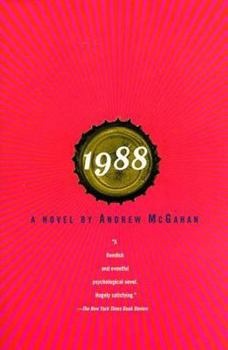1988
Select Format
Select Condition 
Book Overview
An urgent generational novel by a talented Australian writer. When two frustrated artists take jobs at a remote weather station in Australia's Northern Territory--in hopes of finding solitude and inspiration--their journey affords an unflinching, original, and at times, hilarious look at what it means to grow up in the world today.
Format:Paperback
Language:English
ISBN:0312180322
ISBN13:9780312180324
Release Date:March 1998
Publisher:St. Martins Press-3PL
Length:314 Pages
Weight:0.85 lbs.
Dimensions:0.8" x 5.4" x 8.8"
Customer Reviews
4 ratings
Very Funny
Published by Thriftbooks.com User , 24 years ago
I think other reviewers are over-analysing this book - perhaps they don't "get it"? 1988 was the bi-centenial year for Australia. Instead of celebrating it, these two guys decide to leave the city and take a job in one of the most remote parts of the country! Great idea! or so it seems.I found this book very funny, and have bought it as a present for friends who loved it. Praise (also by McGahan and now a Film) has a much "darker" humour, but is just as "real life". 1988 is not set in the Outback, as other reviewers have said. It's set in the far north of Australia, on the coast. This environment is quite different, and interesting as a predicament. The fact that it is so isolated is what makes 1988 so funny. I suspect the humour in 1988 just doesn't translate very well. And that's ok.Comparisons to Salinger don't make sense to me. This is no Catcher in the Rye (1951). It's Australia today. A closer comparison might be John Birmingham's The Tasmanian Babe Fiasco, another Australian writer with a contemporary-Brisbane focus.I've just started reading McGahan's third Book "Last Drinks". It's very good too. His first fictional work, set around the Brisbane Inquiry into official corruption.
better than praise
Published by Thriftbooks.com User , 24 years ago
Andrew McGahan won the Vogel Award (Australia's most well-known award for previously unpublished young writers)for "Praise" but I think 1988, the subsequent prequel, is much better. I was really surprised at the number of negative reviews essentially saying this book was eventless, meaningless and a waste of time. 1988 is not written in a style that is easy to swallow: McGahan's writes flat, almost ugly prose that is distinctly "anti-literary", and it seems like a lot of readers haven't been able to get beyond that. But you can't confuse a character's meaningless existence with a meaningless novel.I guess the written word carries a certain aesthetic responsibility that the spoken work doesn't. We expect the language of novels to have some kind of "beauty". Bret Easton Ellis started to challenge some of these expectations and got a lot of criticism for it. But even Ellis' so-called "anti-glamour" approach is highly stylised.McGahan however, writes like someone would speak -or at least how his characters would speak. Plain language. It's not something we're used to in novels - we expect imagery, metaphors, some kind of artistic take on the uglier aspects of life. But McGahan refuses to give us that - boredom, inadequacy, lack of ambition - he shows it as it is and refuses to glamourise it. Nor does he condemn it. That's the strength of this book - it's not a moral judgement on the twenty-something generation but it's not about mindless amorality. I loved the way it was written - refreshingly unpretentious, and funny too. I was surprised no-one else mentioned there is a real humour in this book. It's subtle and deadpan but maybe not that easy to pick up. I also wondered to what extent the ability to enjoy this book was a cultural thing. I noticed that most of the people who didn't get anything out of it were not from Australia, whereas most of those who loved it, were.
Who is Salinger?
Published by Thriftbooks.com User , 25 years ago
McGahan'll someday be obsolete, too, and as old hat as J.D. Salinger. But right now he's the best; the Whatever Generation's voice (um ... sort of).
1988 continues to haunt
Published by Thriftbooks.com User , 26 years ago
I read 1988 over six months ago. It is the kind of book that leaves you wondering, did I love it or did I hate it? The questions you ask yourself to find that answer are the most important questions of our generation. What is nihilism? What do we expect from nature,culture, spirituality and the fiction surrounding it. 1988 is a disturbing book in the way the works of Dennis Cooper and Mary Gaitskill are disturbing accept McGahan(sp?) goes beyond their familiar transgressive images. I wasn't sure what I thought of 1988 when I read it but six moths later it continues to haunt me. I still can picture that run down shack in the outback. I can feel the familiar horror of nothing much happening at all. I remember his concise writing style that made me trust him and believe he was telling a truth. When I think of the emptiness and the nihilism of my genreation, I think of MgGahan, and I'm still thinking.





